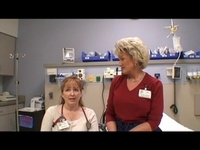At forum, Central Texas leaders say they’ll work together to solve crisis in health care
November 19, 2008
At a invitation-only forum last night at KLRU’s studios called “Critical Condition — Central Texas,” a panel of 13 health care leaders came together to talk about the state of health care in the Austin area. They talked about a fragmented system for delivering care; they touched on the region’s fragmented leadership in health care. Not a good combination for solving the crisis.
Written by Mary Ann Roser , The Austin American Statesman

As the nation’s economic crisis drags on and more people are laid off, how many of us will join the ranks of “the uninsured?” You? Me? It’s a scary thought.
At a invitation-only forum last night at KLRU’s studios called “Critical Condition — Central Texas,” a panel of 13 health care leaders came together to talk about the state of health care in the Austin area. They talked about a fragmented system for delivering care; they touched on the region’s fragmented leadership in health care. Not a good combination for solving the crisis.
The forum, before an audience of 150 people involved in health care, was a follow-up to a national PBS program, “Critical Condition” that aired in September and was written about in this space.
Last night’s panelists described health insurance as being out of reach for many people, not just the poor, but also to middle class workers who might suddenly be unemployed, disabled or through a bad choice, caught without health insurance when an unforeseen illness strikes. (Check out the comments on my blog Monday for some other perspectives.)
“I think we need to be very careful about judging people the way we do,” said David Zuniga, director of programs at Hospice Austin.
Uninsured people not only struggle to get care, but they financially strain a community’s health care resources, several panelists said. I hesitate to use the word “system” because, as Dr. Kenneth Shine, University of Texas System chancellor and a medical doctor, said: “We have a health care non-system.” Care is fragmented, forcing patients to get services piecemeal, especially when their condition is complicated and they need a range of services. If navigating health care “can be hell” for the insured, imagine what it’s like for people who don’t know how they’re going to pay for it, said panelist Anne Dunkelberg, associate director of the Center for Public Policy Priorities.
She suggested that health care be treated like police, fire and schools: Everyone pays a fee and everyone gets it. That would take finances out of the equation, she said.
Bu what happens to the uninsured is often a function of geography. Hays County has less to offer than Travis County, for example, with the county line dictating what kind of care patients get. Hays County Judge Elizabeth Sumter said her county doesn’t have certain specialists for uninsured patients. Dr. Christopher Ziebell said after uninsured patients from other counties leave his hospital, the University Medical Center at Brackenridge, it can be hard to find rehabilitation and other programs willing to take them. Why aren’t there regional solutions for these problems?
State laws and regulations are barriers, but aside from that, panelists said they don’t know why there isn’t more collaboration.
“Get on the same page,” Shine said.
Other panelists agreed. They agreed health insurance reform is needed, along with regional solutions to health-care delivery problems and ways of covering and treating the uninsured. Hospitals should reduce costs by investing in prevention and being more efficient, panelists said. The entire system should place more emphasis on prevention instead of rewarding “sick care,” as Ziebell put it.
Several times panelists said there is money in the system already to reform it. Getting rid of waste and re-ordering priorities are places to start, they said.
What’s next? Sixteen or so organizations have committed to work on the issue, KLRU said. It will solicit feedback from the community during the next few months. In the spring, KLRU plans to present an action plan to “improve access to health care and health status for Central Texans.”
We’ll stay tuned.
![]()
![]()
Related Stories
![]()
Fair Use Notice
This site contains copyrighted material the use of which has not always been specifically authorized by the copyright owner. We are making such material available in our efforts to advance understanding of environmental, political, human rights, economic, democracy, scientific, and social justice issues, etc. We believe this constitutes a "fair use" of any such copyrighted material as provided for in section 107 of the US Copyright Law. In accordance with Title 17 U.S.C. Section 107, the material on this site is distributed without profit to those who have expressed a prior interest in receiving the included information for research and educational purposes. For more information go to: http://www.law.cornell.edu/uscode/17/107.shtml. If you wish to use copyrighted material from this site for purposes of your own that go beyond "fair use", you must obtain permission from the copyright owner.